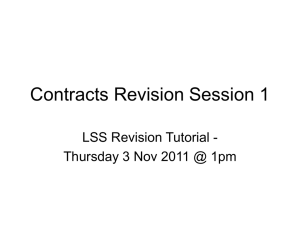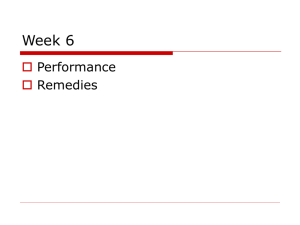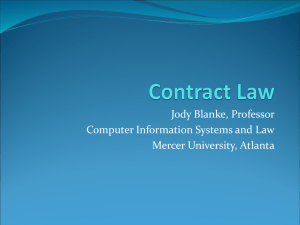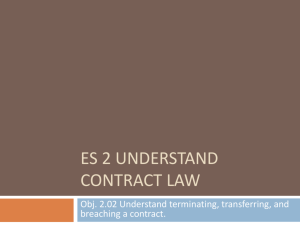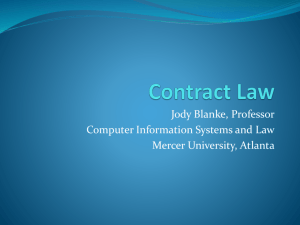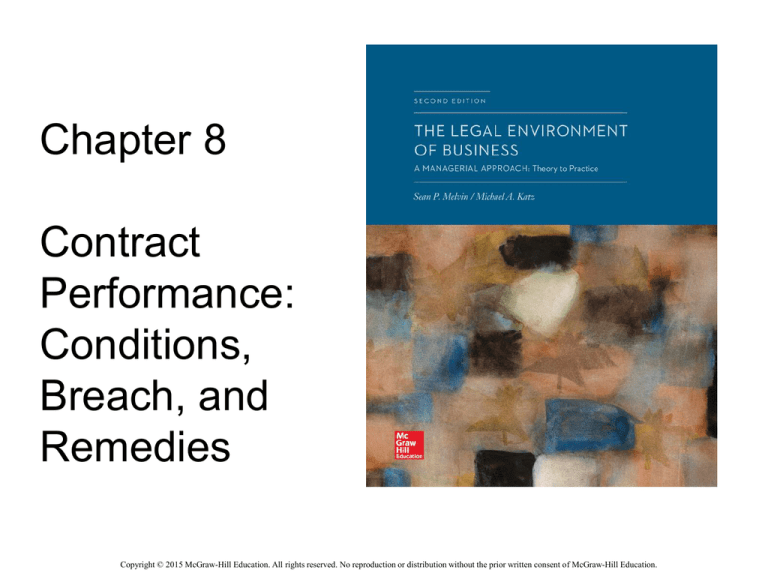
Chapter 8
Contract
Performance:
Conditions,
Breach, and
Remedies
Copyright © 2015 McGraw-Hill Education. All rights reserved. No reproduction or distribution without the prior written consent of McGraw-Hill Education.
Nature and Effect of Conditions
An event that triggers a particular risk
associated with performing a contract is
known as a condition.
8-2
Perfect Performance versus
Substantial Performance
• Perfect performance is when the parties to a
contract completely perform their obligations.
• In order to prevail in a substantial performance
case, the party trying to enforce the contract
must show that she acted in good faith and that
any deviation from the required performance
was not material.
8-3
Other Events of Discharge
• Mutual Consent
– If neither party has fully performed, the parties
may agree to cancel the contract. This
cancellation is known as a rescission.
– Under the doctrine of accord and
satisfaction, one party agrees to render a
substitute performance in the future (known
as accord), and the other party promises to
accept that substitute performance in
discharge of the existing performance
obligation.
8-4
Other Events of Discharge
• Impossibility
– If the performance under the contract
becomes impossible, because of (1)
destruction of the subject matter, (2) death or
incapacitation, (3) the means of performance
contemplated cannot be performed, or (4)
performance under the contract becomes
illegal, the contract may be subject to
discharge.
8-5
Other Events of Discharge
• Impracticability
– If the performance under the contract
becomes extremely burdensome due to some
unforeseen circumstance occurring between
the time of agreement and the time of
performance, the contract may be subject to
discharge.
8-6
Other Events of Discharge
• Frustration of Purpose
– May be used to discharge an obligation if,
after the parties enter into an agreement, (1) a
party’s principal purpose is substantially
frustrated without her fault, (2) some event
occurred, when the nonoccurrence of the
event was a central assumption of both
parties when entering into the contract, and
(3) the parties have not otherwise agreed on
who bears the risk of such an occurrence.
8-7
Other Events of Discharge
• Operation of Law
– The parties may also be discharged through
operation of law when (1) a contract is
unilaterally altered by a party, (2) a contract is
subject to relief of the Bankruptcy Code, or (3)
expiration of the statute of limitations.
8-8
Breach
• When a party to an agreement owes a
duty to perform and fails to fulfill her
obligation, she is said to have breached
the contract.
• The party that suffered the breach is also
entitled to sue the breaching party in an
attempt to recover money damages
(remedies).
8-9
Remedies at Law
• Compensatory Damages
– These damages are an attempt to put
the non-breaching party in the same
position she would have been in if the
other party had performed as agreed.
• Out-of-pocket damages
• Profits
8-10
Remedies at Law
• Consequential Damages
– Consequential damages compensate
the nonbreaching party for foreseeable
indirect losses not covered by
compensatory damages.
• Hadley v. Baxendale
8-11
Remedies at Law
• Liquidated Damages
– Damages that the parties agree to
ahead of time.
• Damages cannot be excessive so as to
penalize the breaching party.
8-12
Equitable Remedies
• Specific Performance
– Is a remedy whereby a court orders the
breaching party to render the promised
performance by ordering the party to take a
specific action.
• This remedy is available only when the
subject matter of the contract is sufficiently
unique so that money damages are
inadequate.
8-13
Equitable Remedies
• Injunctive Relief
– A court order to refrain from performing a
particular act is known as injunctive relief.
8-14
Equitable Remedies
• Reformation
– When the parties have imperfectly expressed
their agreement and this imperfection results
in a dispute, a court may change the contract
by rewriting it to conform to the parties’ actual
intentions.
8-15
Third-Party Beneficiaries
A third party who benefits from a contractual
promise between two other parties may only
seek damages if she is an intended
beneficiary as opposed to an incidental
beneficiary.
8-16


